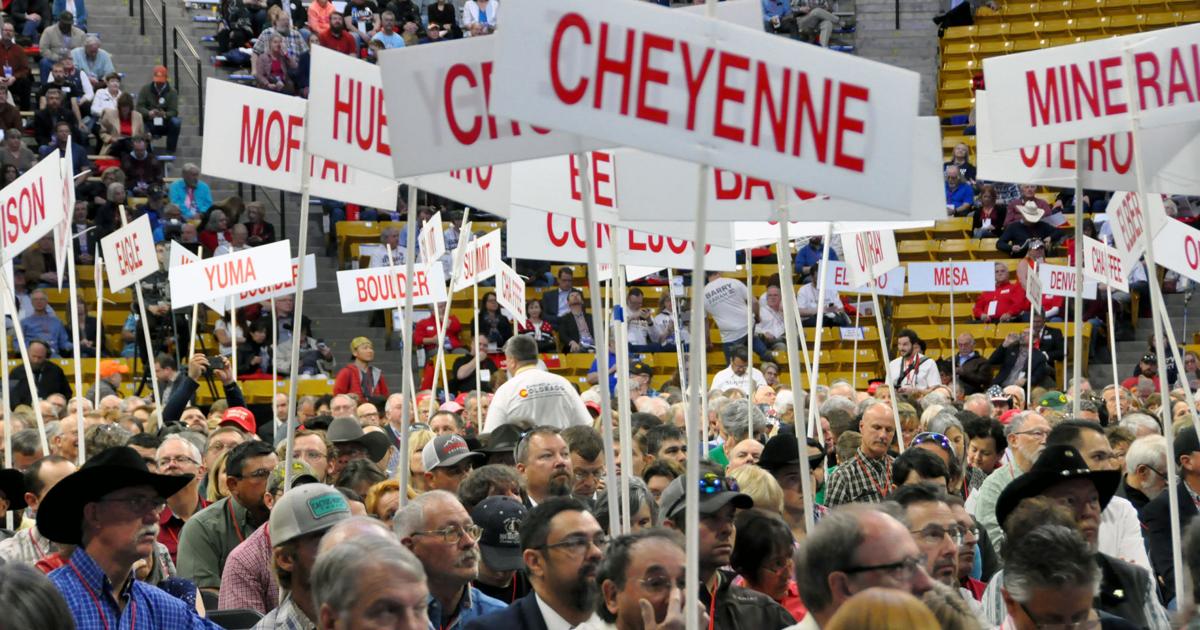
Colorado Republicans are at odds over the latest proposals to close the party’s primaries to unaffiliated voters, with advocates on both sides of the debate accusing fellow supporters of threatening the viability of the GOP in an increasingly Democratic state.
The longstanding dispute erupted this week when one of the county’s largest Republican parties in the state passed a resolution opposing a proposed amendment to the state’s GOP bylaws that would allow the party to more easily opt out of Colorado’s semi-open primary system.
Scheduled to be decided at an Aug. 5 meeting of the state’s GOP central committee, the amendment would lower the threshold for passing certain issues by counting absent and non-voting members as “yes” votes.
The proposal “is not only morally and ethically wrong, but may also violate state and federal constitutions as well as Colorado state statutes,” the Weld County Republican Party said in a resolution approved by its executive committee on Tuesday.
“To automatically make a no vote a yes goes against the principles on which this country was built,” Weld County GOP acting chairman Hunter Rivera said in a statement.
“We need to collectively start focusing our efforts on getting Republicans in power rather than continuing to create purity tests or ideas like this amendment that only further divide the party,” he added.
A former state GOP chairman told Colorado Politics the proposed bylaws amendment smacks of Stalinism, while his sponsor said reactions to his proposal demonstrate why the party needs to loosen the grip Republicans have on the party if it is to start winning elections again.
Certains républicains blâment le système primaire semi-ouvert de l’État pour la série de pertes du GOP lors des trois dernières élections générales, laissant le parti avec moins de pouvoir dans tout l’État qu’il n’en a joui à tout moment depuis les années 1930. D’autres, cependant, avertissent que la fermeture des primaires républicaines du Colorado risque de pousser les électeurs non affiliés de l’État – qui représentent près de la moitié de l’électorat – encore plus fermement dans les bras des démocrates.
Indeed, the proposed bylaws change would increase the chances that state Republicans could meet the requirements set out by voters in Proposition 108, the 2016 ballot measure that allows unaffiliated voters to participate in the Republican and Democratic primaries. Under the law, it takes an affirmative vote of 75% of the parties’ state central committee members to “withdraw” from the primary and instead nominate a candidate on the general election ballot using their own procedures.
Republican critics of the law say that’s an unreasonably high bar, noting that only 75% of the party’s central committee even attended its meetings, making it an impossible hurdle.
It’s just one step in a multi-pronged effort by state GOP leaders to revamp how the party nominates general election ballot candidates.
Other elements of the campaign to prevent unaffiliated voters from voting in the Republican primaries include a revived lawsuit For challenge the state’s primary system on constitutional grounds and a proposal that the party hold its own statewide primaries open only to Republicans, using volunteers and ballots dropped off at rally locations in each county.
The party plans to vote on whether to withdraw from the primary at a later meeting, tentatively scheduled for Sept. 30, state GOP Chairman Dave Williams told Colorado Politics.
At the same meeting, he added, the central committee will be able to decide between various alternative nominating procedures, including sticking with the caucus and assembly process or trying something new, such as a statewide “assembly” process akin to the one Republicans used in Virginia.
“We want to give options to the central committee and let them decide,” Williams said. “They could very well just opt out, and we would default to what we currently have with the caucus and assembly system, or they could choose an alternate plan that still involves caucuses and assemblies but adds other steps.”
The state GOP has considered proposals to opt out of the primary system three times since the ballot measure was passed, but each time supporters have well below the required supermajority. During the last attempt two years ago, directed by Williamsonly 33% of the central committee voted in favor of abolishing the existing primary system.
Since the measure was passed ahead of the 2018 election, Democrats have not seriously considered scrapping their primary.
A former Colorado Springs state legislator, Williams has made his support for removing the primary system a key element in his race for the leadership of the party earlier this year.
“I think we need to do something different in general because everything we’ve done over the last few cycles hasn’t worked,” he said. “At the end of the day, if we’re going to be successful, I think we need to get back to a place where we’re able to nominate Republicans with only Republican voters.”
Williams added that he was not intimidated by suggestions that the proposed amendment to the bylaws could face a legal challenge if passed.
“We believe that any attempt to withdraw from the party will lead to litigation from those who want to preserve the petition process and those who make money from the petition process,” he said. “There are a lot of consultants and scam artists whose paychecks would be at risk, so I would expect a legal challenge from those guys.”
Republican consultant Dick Wadhams, a former state party chairman, said the party he once led could be led off a cliff if it excludes unaffiliated voters from its primaries.
“I never cease to be amazed at the profound ignorance of people who want to do this compared to the reality of the Colorado electorate today,” he said. “These people have no idea the one way Colorado Republicans have won statewide races in this state.”
Wadhams, who successfully won statewide GOP campaigns in the 1990s and early 2000s — including for Bill Owens, Colorado’s only elected Republican governor in the past 50 years — said efforts by Williams and his supporters to “cleanse” the party will only make things worse for Republicans in the state.
“They ran campaigns that didn’t speak to the core party,” Wadhams said. “They ran a campaign that could unify the Republican vote while attracting votes from unaffiliated voters.”
Wadhams denounced the proposed amendment to the statutes as a “Stalinist” ploy to circumvent the law.
“When you try to manipulate people into voting a certain way, it’s straight out of the Stalinist playbook,” he said, trying to suppress an incredulous laugh. “They say if you’re on the committee and you don’t show up, we’ll vote for you. They see a conspiracy behind every corner in terms of voter fraud, and yet it’s a conspiracy to steal people’s votes – there’s no other way to look at it.”
Colorado Springs Republican Eli Bremer, a former El Paso County GOP chairman and 2022 U.S. Senate candidate, said the proposed amendment was emblematic of the state’s GOP approach under Williams, who was the county party’s vice chairman under Bremer.
“I think it’s completely ironic that a party that’s supposed to buy into the intent of lawmakers at the time the law was created would take such blatant action against the intent of voters who passed this law,” he said, adding, “If they don’t change the bylaws, I think everyone will admit it’s DOA. I don’t think you’re going to get 75% rejection.”
Lawyer and newspaper publisher Chuck Bonniwell, a member of the state’s GOP executive committee and chairman of a special committee to explore opt-out options, said he was amused by the reactions to what he called “my obscure little amendment.”
“Man, I blew myself up. It’s hilarious when you finally try to do something positive and the RINO wing of the party goes crazy,” he said in an interview, using a derisive acronym for Republican in name only.
“All it does is at least give us a chance to opt out. It’s a last ditch attempt to salvage what’s left of the Republican Party in Colorado,” he said.
“What is the moan? What is the endless moan? said Bonniwell. “Why would we want our primaries to be dominated by people who don’t necessarily share our ideas and concepts — they don’t believe enough to register as Republicans. Why should they decide?”
Noting that it only takes a few minutes to change affiliations online in Colorado, Bonniwell added that he looks forward to debating the issue at the next GOP central committee meeting.
“It’s a high threshold, but I think people are ready to change now,” he said. “They’ve been doing it the Dick Wadhams way for the last seven years and it’s just been a disaster.”
He dismissed arguments that unaffiliated voters will “get mad at you” if Republicans don’t let them in the primary.
“They didn’t do it in Virginia,” he said. “They elected Glenn Youngkin as governor of Virginia.”
Youngkin led what amounted to a comeback for Republicans in that state in 2021 after winning the nomination through a process similar to the statewide assembly system that Bonniwell plans to offer as an alternative to the open primary for Republicans in Colorado.
Wadhams said he found the alternative nomination procedure proposed by Bonniwell – who pointed out the details were still being worked out – unintentionally hilarious as it would involve organization and expense far beyond the capabilities of the current state party.
“There’s a part of me that almost wishes they would win this battle and try to implement this plan because they would look like fools,” he said. “It would be so comical. It would be tragic for the state, but it would be so comical to see these clowns trying to implement something like this.”


